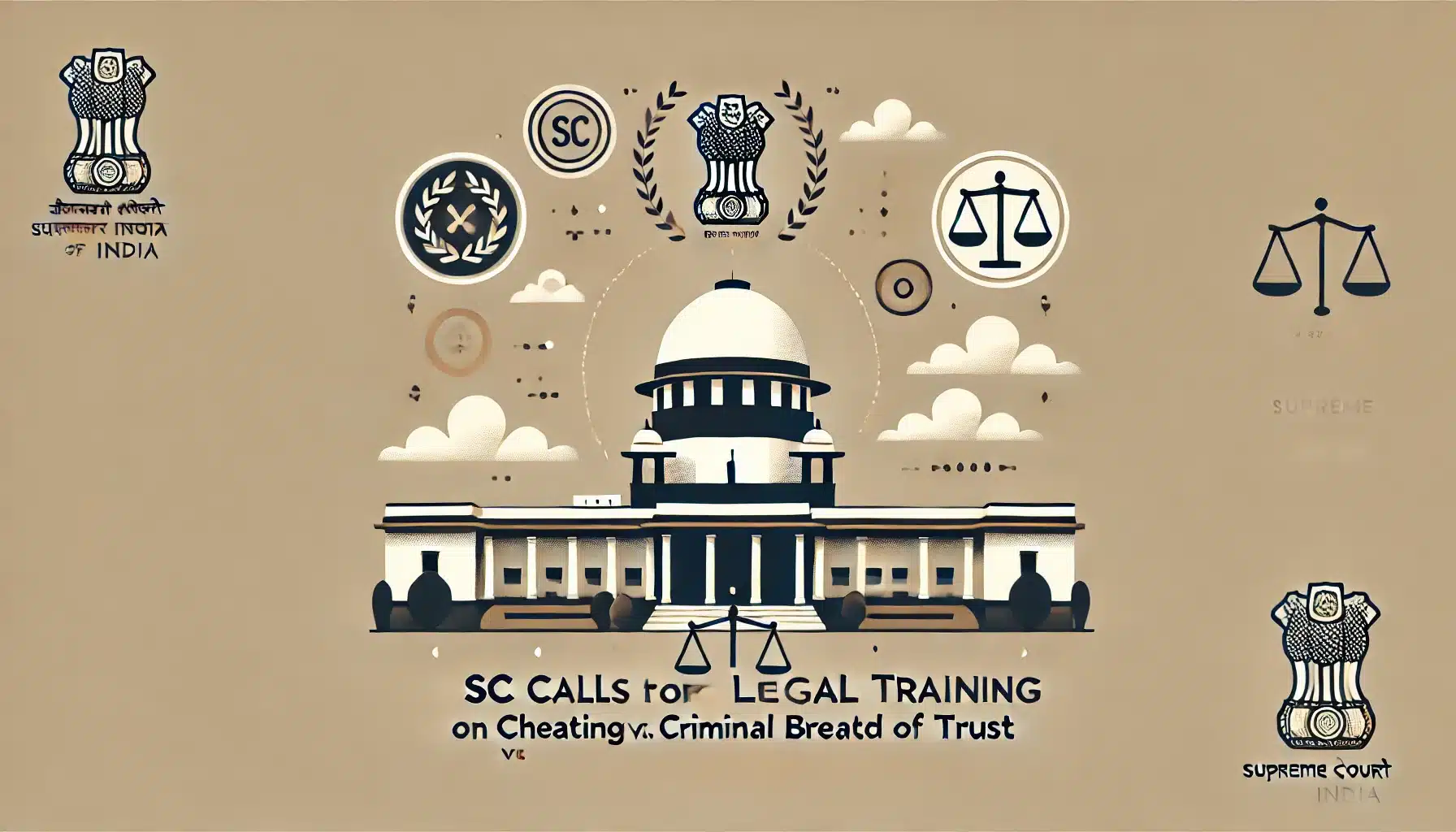On August 23, 2024, the Supreme Court of India stressed the need for better legal training for police officers to help them properly differentiate between the offenses of cheating and criminal breach of trust. The Court clarified that these two distinct offenses cannot coexist under the same facts a

On Friday, August 23, 2024, the Supreme Court of India highlighted the necessity of proper legal training for police officers across the country to help them understand the fine distinctions between the offenses of cheating and criminal breach of trust. The ruling came during a hearing involving Delhi Race Club (1940) Ltd. & Ors. Versus State of Uttar Pradesh & Anr., where the Court overturned a decision by both the High Court and the Chief Judicial Magistrate.
The Supreme Court Bench, composed of Justices JB Pardiwala and Manoj Misra, pointed out that the two offenses are distinct, cannot coexist simultaneously, and must be handled with specific attention to their differing legal principles. The Court further directed that copies of the judgment be sent to the Principal Secretary, Ministry of Law & Justice, Union of India and the Principal Secretary, Home Department, Union of India, to emphasize the importance of understanding these distinctions.
Key Legal Observations:
- Distinction Between Offenses: The Supreme Court stressed that cheating and criminal breach of trust are distinct offenses that cannot exist together in the same set of facts.
- “Both offences are independent and distinct. The two offences cannot coexist simultaneously in the same set of facts. They are antithetical to each other. The two provisions of the IPC (now BNS, 2023) are not twins that they cannot survive without each other.”
- Failure of Judicial System: The Court lamented that despite many years, courts and law enforcement agencies have struggled to understand the difference between these offenses.
- “It is indeed very sad to note that even after these many years, the courts have not been able to understand the fine distinction between criminal breach of trust and cheating.”
Court’s Directions:
- Legal Training for Police: The Court urged that police officers be provided proper training in law to correctly ascertain whether a complaint involves cheating or criminal breach of trust when an FIR is registered.
- Mechanical FIR Registration: The Court criticized the practice of mechanically registering FIRs for both cheating and criminal breach of trust based on vague allegations of dishonesty or fraud, without careful analysis.
- Magistrate’s Responsibility: The Court emphasized the role of Magistrates in meticulously examining the contents of private complaints to determine whether the offenses of cheating or criminal breach of trust are made out from the facts presented.
- “The Magistrate has to carefully scrutinise the evidence brought on record and may even himself put questions to the complainant and his witnesses to elicit answers to find out the truthfulness of the allegations or otherwise and then examine if any offence is prima facie committed by all or any of the accused.”
Case Background:
- Factual Allegations: The case involved a company accused of failing to make payments for horse grains and oats supplied by the complainant.
- Error in Lower Courts: Both the Magistrate and the High Court were found to have erred in issuing a process under Sections 406 (Criminal Breach of Trust) and 420 (Cheating) of the Indian Penal Code. The Supreme Court found that the evidence presented lacked the essential ingredients to support these offenses.
- Supreme Court’s Analysis: The Court clarified the difference between criminal breach of trust and cheating:
- For cheating, criminal intent must exist at the time of making false representations.
- For criminal breach of trust, proof of entrustment of property is sufficient, and dishonesty arises when the entrusted property is misappropriated.
- “In the case of cheating, the offender fraudulently or dishonestly induces a person by deceiving him to deliver any property. In such a situation, both the offences cannot coexist simultaneously.”
- Conclusion on Facts: The Court held that in the absence of entrustment of property, no offense under Section 406 IPC could be made out, as the case involved non-payment for goods sold, which would fall under civil law rather than criminal law.
- “Once the property in the goods passes to the purchaser, it cannot be said that the purchaser was entrusted with the property of the seller. Without entrustment of property, there cannot be any criminal breach of trust.”
Concerns Over Summons Issuance:
- Summons in Criminal Cases: The Court raised concerns over the casual issuance of summons in criminal cases, noting that summoning an accused should not be done mechanically but only after careful consideration of the facts and law involved.
- “Summoning of an accused in a criminal case is a serious matter. Criminal law cannot be set into motion as a matter of course.”
- Failure of the Magistrate: The Court criticized the Magistrate for failing to assess whether the officers of the company could be personally liable for the company’s alleged acts and for failing to establish whether the case involved cheating or criminal breach of trust.
- “The Penal Code does not contain any provision for attaching vicarious liability on the part of the appellant Nos. 2 and 3 who are none other than office bearers of the appellant No. 1 Company.”
Legal Representation:
- For Petitioner(s): Mr. Suhail Dutt, Sr. Adv., Mr. Sankalp Goswami, Adv., Mr. Azhar Alam, Adv., Ms. B. Vijayalakshmi Menon, AOR
- For Respondent(s): Mr. Rajat Singh, AOR, Mr. Neeraj Kumar Sharma, Adv., Mr. Sarthak Chandra, Adv., Mr. Raghav Garg, Adv.
Click to read: Delhi Race Club (1940) Ltd. & Ors. Versus State of Uttar Pradesh & Anr., CRIMINAL APPEAL NO. 3114 OF 2024





